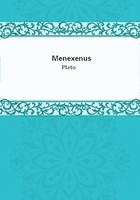
第3章 APPENDIX I.(3)
The Menexenus or Funeral Oration is cited by Aristotle, and is interesting as supplying an example of the manner in which the orators praised 'the Athenians among the Athenians,' falsifying persons and dates, and casting a veil over the gloomier events of Athenian history. It exhibits an acquaintance with the funeral oration of Thucydides, and was, perhaps, intended to rival that great work. If genuine, the proper place of the Menexenus would be at the end of the Phaedrus. The satirical opening and the concluding words bear a great resemblance to the earlier dialogues; the oration itself is professedly a mimetic work, like the speeches in the Phaedrus, and cannot therefore be tested by a comparison of the other writings of Plato. The funeral oration of Pericles is expressly mentioned in the Phaedrus, and this may have suggested the subject, in the same manner that the Cleitophon appears to be suggested by the slight mention of Cleitophon and his attachment to Thrasymachus in the Republic; and the Theages by the mention of Theages in the Apology and Republic; or as the Second Alcibiades seems to be founded upon the text of Xenophon, Mem. Asimilar taste for parody appears not only in the Phaedrus, but in the Protagoras, in the Symposium, and to a certain extent in the Parmenides.
To these two doubtful writings of Plato I have added the First Alcibiades, which, of all the disputed dialogues of Plato, has the greatest merit, and is somewhat longer than any of them, though not verified by the testimony of Aristotle, and in many respects at variance with the Symposium in the description of the relations of Socrates and Alcibiades. Like the Lesser Hippias and the Menexenus, it is to be compared to the earlier writings of Plato. The motive of the piece may, perhaps, be found in that passage of the Symposium in which Alcibiades describes himself as self-convicted by the words of Socrates. For the disparaging manner in which Schleiermacher has spoken of this dialogue there seems to be no sufficient foundation. At the same time, the lesson imparted is simple, and the irony more transparent than in the undoubted dialogues of Plato. We know, too, that Alcibiades was a favourite thesis, and that at least five or six dialogues bearing this name passed current in antiquity, and are attributed to contemporaries of Socrates and Plato. (1) In the entire absence of real external evidence (for the catalogues of the Alexandrian librarians cannot be regarded as trustworthy); and (2) in the absence of the highest marks either of poetical or philosophical excellence; and (3) considering that we have express testimony to the existence of contemporary writings bearing the name of Alcibiades, we are compelled to suspend our judgment on the genuineness of the extant dialogue.
Neither at this point, nor at any other, do we propose to draw an absolute line of demarcation between genuine and spurious writings of Plato. They fade off imperceptibly from one class to another. There may have been degrees of genuineness in the dialogues themselves, as there are certainly degrees of evidence by which they are supported. The traditions of the oral discourses both of Socrates and Plato may have formed the basis of semi-Platonic writings; some of them may be of the same mixed character which is apparent in Aristotle and Hippocrates, although the form of them is different. But the writings of Plato, unlike the writings of Aristotle, seem never to have been confused with the writings of his disciples: this was probably due to their definite form, and to their inimitable excellence. The three dialogues which we have offered in the Appendix to the criticism of the reader may be partly spurious and partly genuine; they may be altogether spurious;--that is an alternative which must be frankly admitted. Nor can we maintain of some other dialogues, such as the Parmenides, and the Sophist, and Politicus, that no considerable objection can be urged against them, though greatly overbalanced by the weight (chiefly) of internal evidence in their favour. Nor, on the other hand, can we exclude a bare possibility that some dialogues which are usually rejected, such as the Greater Hippias and the Cleitophon, may be genuine.
The nature and object of these semi-Platonic writings require more careful study and more comparison of them with one another, and with forged writings in general, than they have yet received, before we can finally decide on their character. We do not consider them all as genuine until they can be proved to be spurious, as is often maintained and still more often implied in this and similar discussions; but should say of some of them, that their genuineness is neither proven nor disproven until further evidence about them can be adduced. And we are as confident that the Epistles are spurious, as that the Republic, the Timaeus, and the Laws are genuine.
On the whole, not a twentieth part of the writings which pass under the name of Plato, if we exclude the works rejected by the ancients themselves and two or three other plausible inventions, can be fairly doubted by those who are willing to allow that a considerable change and growth may have taken place in his philosophy (see above). That twentieth debatable portion scarcely in any degree affects our judgment of Plato, either as a thinker or a writer, and though suggesting some interesting questions to the scholar and critic, is of little importance to the general reader.
MENEXENUS
byPlato (see Appendix I above)
Translated by Benjamin Jowett